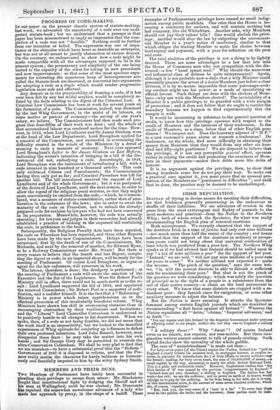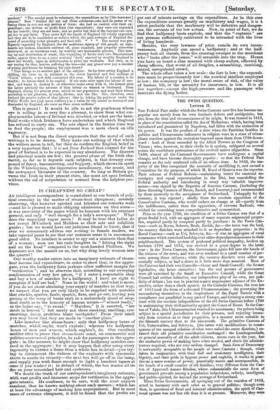IRISH REPUDIATION.
INSTEAD of trying to devise means for meeting, their difficulties, we find Irishmen generally persevering in the endeavour to shuffle off their liabilities. We see advocates of evasion in the press from the most extravagant and flighty of journals to the most moderate and practical—from the Nation to the Northern Whig; both of whom attack the Spectator, for what was really recommending the English plan of renewed exertions. Both misrepresent. We recently observed that the support of the destitute Irish in a time of jizmine had only cost nine millions —not much more than half the rental of the country ; and hence inferred that the support of the destitute in ordinary or prospe- rous years could not bring about that universal confiscation of land which was predicted from a poor-law. The Northern Whig speaks as if we had advised that Ireland should be called upon to pay "a tax of nine millions a year" for the support of her poor. "Ireland," we are told, "will not pay nine millions of a poor-rate for years to come." We neither advised nor expected it : quite the reverse. "The pinch of the question," says the same wri- ter, "is, will the poorest districts be able to furnish a sufficient rate for maintaining their poor." But that is not the pinch of the question we were considering; which was solely the question of principle as to the right of a people to a subsistence from the soil of their native country—a claim on the land paramount to every other. We know that some districts are clogged with a re- dundant poor : they furnish cases for emigration, or some other auxiliary measure to adjust the balance. But the Nation is more amusing. It attacks the Spectator foremost among certain English journals which are described as recommending "a fieri facies against all Ireland"! Whereas the Nation repudiates all "debts,' 'claims,' Imperial advances,' and so forth "— " For any monies sent into Ireland by the Imperial Government under pretence of affording relief to our people, neither she nor they owe to England a solitary ducat."
"A solitary ducat ! " Why " ducat "? Of course Ireland owes us no ducats, nor sequins, nor rose-nobles. But these ima- ginative writers cannot consent to talk of pounds sterling. Such verbal freaks show the unreality of the whole gabble. The case of" unindebtedness " is made out thus— For forty-seven years (of the Union) argues the Nation, Ireland has "paid to England a yearly tribute (in absentee rent, in mortgagee interest, in surplus re- venue, in payment for manufacture, &c.) of from fifteen to twenty millions—say the former; making, for forty-seven years, the sum of 705,000,0001. of money,—a small capital, by the way, amounting to nearly the whole British National Debt. This is a plain and undeniable truth." Moreover, Englishmen confess that "the Irish famine of '47 was caused by the previous 'misgovernment by England.'" " Ireland does not owe, therefore, a shilling to England. The famine was her work—her evil; we are the sufferers; and no power on earth or in heaven would
adjudge us tom for the suffering. So far from being in her debt, she is in ours, on this international score, to the amount of some seven hundred millions; which she, of course, repudiates.'
"But, look you, the very name of a 'loan' is a lie." "To every loan there must be two parties, the lender and the borrower; these parties must be aide- pendent." "The receipt must be voluntary, the expenditure as he [the borrower] pleases." New "Ireland did not ask these advances--ehe had no power of re- fusing them in toto nor any portion of them; she had no control over their ex- penditure; she derives no profit from that expenditure; they were not expended for her benefit; they are not hers; and no power but that of the bayonet can com- pel her to pay them. They never kit the hands of England till totally expended, and they are to be considered as monies which the paid servants of England of according to her pleasure and their will. * • • The money was pro- fligately expended by England for the malicious injury of this people, as sign- boards are broken, knockers screwed off, glass smashed, and property otherwise destroyed, at an enormous cost, by wealthy and fashionable persons. This tear- ing up and destruction of roads, this trampling of fertile land into Macadamized rocks, appear thus, to us, a great national lark,' enacted by wealthy England to show her wealth, upon us unfortunates to prove our weakness. But then, as to our paying for that, besides suffering the loss—did any grocer ever pays number of young gentlemen for breaking his sign-board? "This brings us to another part of the subject. So far from owing England a shilling, she owes us, in addition to the seven hundred and five millions of 'Union' tribute a new debt contracted this year. The labour of a country is its wealth; its labour-fund is its capital. If one state seize upon the labour of ano- ther' and waste it, destroy it, or otherwise make away with it, the former owes the latter precisely the amount of that labour so wasted or destroyed. Thus England, during the present year, seized on our population, and used their labour according to her pleasure, in roads, ditches, and the like. She, therefore, owes Ireland the precise value of that labour; that is, taking the payment under the Public Works Act (say seven millions) as a value for the labour so destroyed and dissipated by England, she owes us these seven millions."
This is grand ! It would be idle to ask the gentleman whose
eye is rolling in so very a phrensy, to show from whatem- ploymentth e lab our of Ireland was diverted, or what are the bene- ficial works which Irishmen have undertaken and which England has refused to carry out. The sole object in the famine time was to feed the people ; the employment was a mere check on idle vagrancy. But it is not from the direct arguments that the moral of such writinore is to be drawn. They make out nothing of that which the wnters mean to tell, but they do confirm the English belief in a very important fact : it is not from Ireland that counsel for the good of Ireland is to be expected in any abundance. The discreet and practical minds are few ; the general phase of the Irish cha- Teeter, so far as it regards such subjects, is that dreamy corn- pound of fancy, buccaneering, and beggary, which shows its spirit an the Whiteboyism, the imperative mendicancy, the music, and the newspaper literature of the country. So long as Britain-go- verns the Irish in their present state, she must act upon Ireland, without the aid of cooperation or counsel from the helpless pro- vince.



























 Previous page
Previous page